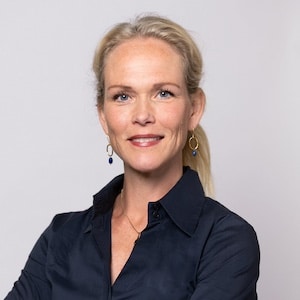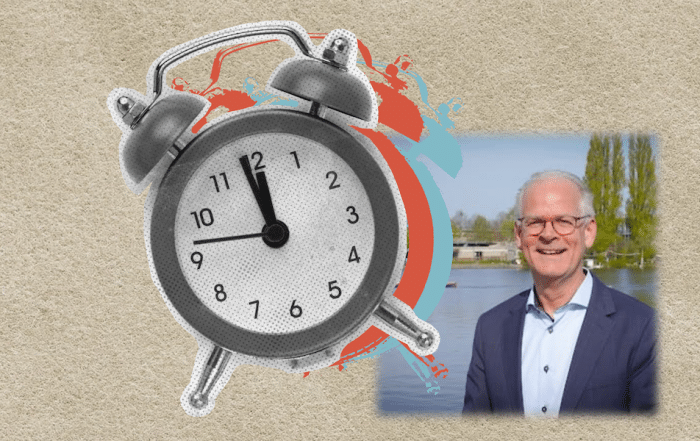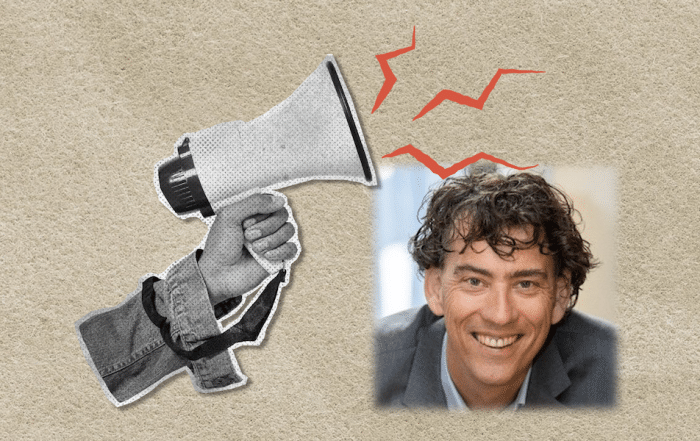Dennis Grimbergen: ‘Free public transport would be a bold move!’
The Metropolis of Tomorrow requires bold choices and breakthroughs. The 'Look differently, act differently' movement offers a new perspective. This argues for a fundamentally different approach and way of working together towards inclusive prosperity. Dennis Grimbergen, councillor in Lelystad: "It helps us find common ground in the difficult dilemmas we face."
Dennis Grimbergen dares to think big. He hopes others will want to join him. From Jansen’s butchery in Lelystad, to the central government. Everyone can approach Look differently, act differently in their own way. “Let go of the rigid lines of thought and dare to make a different choice. It would be bold if the government said: we will offer free public transport, just like in Luxembourg. If the government doesn’t do it, then maybe we as the Amsterdam Metropolitan Area should be headstrong and say: we’ll take care of it. Imagine what that would do for congestion and parking problems in the region. I seriously think it’s a great call and I hope everyone within their circle of influence will pick up the gauntlet.”
What makes the Look differently, act differently movement important to you?
“On a global level, we face a huge challenge. We have to start using our earth differently. The Amsterdam Metropolitan Area is a compact region where major transitions are needed. In the difficult dilemmas, the trick is to find each other. This call contributes to that. In this small, regional area, we should not compete with each other. In three quarters of an hour you can drive from one side of the region to the other. IJmond would like to have the hydrogen proposition, but in Lelystad we also want it. We get the revenue from the wind farms on the coast. The trick is to jointly make sure we start producing hydrogen in a smart way, instead of competing with each other.”
Why is inclusive prosperity an important part of Look differently, act differently?
“In fact, inclusive prosperity is crucial. As a liberal, I don’t necessarily believe in equalisation. I do believe in sharing with each other when you’re well off. Every resident should benefit from developments. We must also fairly share the burdens. Everyone in the region can add value.”
According to Marco Smit, director of the ROM Horizon Flevoland, Economic Boards should focus primarily on the economic part of inclusive prosperity.
“I don’t think you can do that without an integral task. For example, that would mean focusing only on bringing in companies, without thinking about the consequences. We have a big social task as a country and as a region. We cannot house people, while a roof over your head comes first in Maslov’s hierarchy of needs. There is a shortage of 28,000 student housing units in our region. Per month, we register three economically homeless families. Despite sufficient income, they simply cannot find a home. They sleep with their children in their cars. I find that unacceptable. You cannot separate our economy from inclusive prosperity.”
The national elections are just around the corner. What is needed from the State to empower the Look differently, act differently movement?
“The central government sets a heavy regulatory burden. For example, for housing construction. Municipalities and developers can do a better job building houses when there are fewer rules. Take the land positions of the Central Government Real Estate Agency. The government is rigid in assigning other uses. While there are insufficient alternatives for housing.”
“The State itself also needs to look and act differently. The broader sustainability challenge we face as a country is huge. We are getting bogged down. It’s a nice ambition to stop using natural gas. But it’s just not possible yet. It is not yet feasible. We have insufficient capacity to completely electrify. There is a shortage of people, materials and resources.”
Should we adjust our ambition?
“You should never adjust your ambition, because then you’re done. However, we do need to get more creative if we want to become the most sustainable region. Can’t employers or pension funds provide low-interest loans to their employees or participants? They can use those loans to buy solar panels or insulate the house. Economically this may not be interesting for companies, but we have to work as a collective now. Companies should also contribute to that collective. And for this, the government must allow near interest-free loans. I am not saying this is the solution, but this is the looking and acting differently we need to move towards.”
What are you already doing differently in Lelystad, in the interest of inclusive prosperity and other challenges?
“I am quite proud that in Lelystad we recently sold 162 acres of land to companies such as bol.com, Jysk and Bestseller. As a result, we are adding about 15,000 jobs to the region between now and 2030. The remarkable thing is that these companies – in addition to a sales contract – have also signed a social covenant. They commited to arranging education and housing for those in need. The MBO College, for example, is already exploring how to educate their future employees. The first year of their training has now begun.
“The covenant also states that it will be easier to exchange people: if there is no work at one company, a person can get employed at another company. That, of course, is a better prospect than unemployment benefits. For us as a municipality, this is also new: contracts will have a different interpretation.
“We will also build single-family homes for up to 270,000 euros. We are succeeding by having other types of contracts and processes. As a municipality, we then have less say in the color of the roof tile and the shape of the facade. I noticed that the administrative organisation here finds that quite challenging. Through this approach – and by engaging with developers and contractors early on – we can meet this demand.”
The call has been online since July. What’s been the buzz about it so far?
“The reactions go in all directions. Some find it too politically charged, others find it too out of touch with today’s reality. Still others say it’s all wishful thinking. I think getting all sorts of comments is good. It shows that we struck a chord. Our ambitions may seem big, but everyone can get something out of it. You don’t have to participate, of course, but then don’t tell us what we do have to do. See what you can accomplish in your circle of influence and celebrate the small steps.”
Text: Mirjam Streefkerk
26 September 2023
Read more about
Contact us
Want to keep up to date?
Get the best regional news and events (in Dutch) via the Board Update newsletter
Share this news
Want to keep informed?
Follow us daily on LinkedIn and sign up for the Board Update newsletter.
Read more
- What AI applications are we already deploying for healthcare and wellbeing? What ...
- Adyen is one of the great success stories of Amsterdam’s tech ...
- Together with enthusiastic partners in three coalitions, the Amsterdam Economic Board is ...





